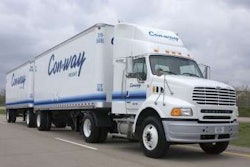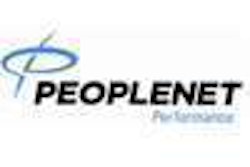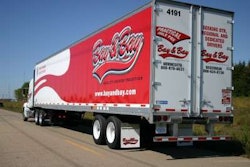Ron Szapacs’ career in fleet maintenance has spanned five decades, and his legacy will continue much longer through his industry involvement and his encouragement of the next generation.
Had you known Ron Szapacs as a child, you hardly would be surprised that he would spend his life working with vehicles. Growing up in Slatington, Pa., as the third child behind brother Joe and sister Jan, Szapacs did all the stuff kids usually do, such as Boy Scouts, football and other sports. But he really loved anything mechanical. At 10, he was the crew for Joe’s Soap Box Derby car. A few years later, he built his own go-kart to race, and later still, he worked weekends and summers for the local Chevrolet dealer.
In 1967, Szapacs began a career in fleet maintenance that continues to this day. Along the way, he has served the industry through tireless involvement in technical associations and by devoting countless hours to cultivating the next generation of fleet professionals. Ron Szapacs’ dedication and leadership have earned him the respect of his peers as well as the honor of the 2009 Commercial Carrier Journal Career Leadership Award.
Getting started
After graduating from Slatington High School in 1963, Szapacs enrolled in a local college, Spring Garden, where he ultimately gravitated toward automotive technology. He graduated in 1967 and soon found himself with an offer to work in the West Chester, Pa., rebuild shop for major bulk hauler Matlack as a machines and fuel injection specialist. United Parcel Service also had come through with a similar offer, but it was in Philadelphia, which didn’t suit the small-town native. Four years later, Szapacs transferred to Northampton, which was Matlack’s largest bulk terminal.
It was around this time that Szapacs married his longtime sweetheart, Lois. Even during the wedding ceremony, he couldn’t escape trucks. During the vows, he noticed the sound of an idling diesel engine. It turned out to be a truck with a flatbed trailer on which benches had been nailed to cart the wedding party through town. Ron and Lois are celebrating their 39th anniversary this year, and Ron credits her for allowing him to spend so much time in various activities throughout his life. “She has sacrificed a lot over the years.”
During the 1970s, Szapacs was moving through the ranks at Matlack and even taking on some unusual special projects. John Rollins, owner of Matlack as well as Rollins Leasing, once asked him to set up a maintenance shop for all the equipment and vehicles he needed for his Rose Hill Plantation resort on Montego Bay in Jamaica. Lois, who was expecting their first child, Becky, went along for the assignment. Local hospitals left much to be desired, and Ron and Lois barely made it back to Pennsylvania for Becky’s birth. Everything worked out fine, though, and today Becky is a labor scheduling manager for Disney in Orlando, Fla.
By 1978, Szapacs was running the largest shop in the Matlack system. Through a local organization, the Lehigh Valley Fleet Maintenance Supervisors Association (LVFMSA), he had become friends with Paul Manwiller, who headed maintenance for Allentown, Pa.-based Air Products & Chemicals. Manwiller, who CCJ honored in 1989 with the Career Leadership Award, asked Szapacs to join the growing Air Products organization to design and lay out vehicle maintenance shops, which he did at more than 20 locations.
Today, as maintenance specialist for power vehicles, Szapacs is responsible for spec’ing; establishing maintenance policies and procedures; developing the preventive maintenance program; managing oil analysis; tracking component lifecycles; managing policy warranty programs; improving fuel economy; and testing and evaluating components. He also advises the international Air Products fleet, which has involved travel to Europe, Asia and South America.
Over the years, Air Products, like many other corporations, has gotten much leaner in management, Szapacs says. With fewer managers in the field, he has grown to depend more and more on the maintenance managers and lead technicians in Air Products’ shops for testing and providing feedback on problems that are arising more frequently.
Szapacs urges fleet managers to recognize the talent they have in their shops – especially the technicians themselves – and make better use of it. “You have a pretty good network of people that give you good, factual information.” He consults with a number of lead technicians on a regular basis and brings them together for an annual meeting. “There’s no way I could do my job justice without them.”
Getting involved
Over the past 20 years or so, Szapacs has become increasingly involved in industry associations. He has served on panels and given presentations at SAE, formerly the Society of Automotive Engineers. He recently received a Member Service Award from SAE for 20 years of service.
For about 10 years, Szapacs has been a member of the American Trucking Associations’ Technical Advisory Group, which advises the ATA engineering department and policy committee on technical policy issues. He chaired TAG from 2005 to 2007.
Szapacs’ most intense industry involvement has been with the Technology and Maintenance Council. He was instrumental in launching the S.15 specialty vehicles study group, and he served as the group’s first vice chairman. He moved to the S.3 engine study group, where he served first as vice chairman and then as chairman. Szapacs currently is a TMC director at large, and several years ago he received the association’s prestigious Silver Spark Plug Award.
During Szapacs’ time as chairman, S.3 delved into a number of important issues affecting engines, including diesel particulate filters, ultra-low-sulfur diesel, biodiesel and the adequacy of cooling systems to deal with increased heat and pressure. Dealing with the increased weight alone is a big but important challenge, Szapacs says. As a bulk hauler, Air Products loses revenue when equipment weight rises. “Each pound of extra weight costs us $10 over the life of a vehicle.”
Another issue for Szapacs is an apparent increase in the number of thermal events – fires – involving large trucks. He raised the issue within TAG a couple of years ago and just last month got the S.3 study group to create a task force on thermal events in the engine compartment. Szapacs concedes that some in the trucking industry were reluctant to acknowledge the possibility of a growing problem out of concern for the public reaction. But he argues that the risk of not getting to the bottom of the issue is greater. “If we don’t get proactive, we’re going to get crazy regulation.”
What makes TMC so valuable is that it brings all the key stakeholders together in developing recommended practices, Szapacs says. It’s not just fleets deciding what they think works best, or engineers or supplier marketing and sales professionals doing the same. By involving all three groups, there is a greater understanding of all the issues. “The result is an RP that works in the real world. It’s a pretty good piece of paper.”
“Ron is one of those rare individuals who sees the big picture and also is technically proficient,” says TMC Executive Director Carl Kirk. “In today’s economy, it seems we are pressured to fall into one camp or the other – purely administrative or purely technical. Every once in a while, a guy comes along like Ron who is knowledgeable about the broader policy issues affecting the trucking industry, yet at the same time knows how decisions made in Washington directly impact the shop floor.”
Szapacs chaired TMC’s S.3 engine study group for about four years, but his influence in the study group goes back much further, says Joe Fleming of Falcon Transport and CCJ’s 2002 Career Leadership Award recipient. “He was vice chair for a long time, and his experience and quiet leadership was evident by the quality and depth of the programs.” As chairman, “he guided TMC through two engine changes and provided well-thought-out tech sessions and mini-tech sessions.” When Szapacs speaks in Shop Talk at the TMC annual meeting, people listen, Fleming says. “I have great respect for his depth of knowledge.”
“Ron is always working to find better ways to maintain equipment and sharing information with his peers,” says Tom Newby, director of field maintenance for Old Dominion Freight Line and recipient of the Career Leadership Award in 2006. “Not many weeks go by that we don’t see an e-mail from Ron inquiring about or sharing information.”
Giving back
Szapacs believes strongly that leaders in technical fields have a duty to encourage the younger generation to enter and excel in such occupations. He is heavily involved in SkillsUSA (www.skillsusa.org), a group that promotes youth education in technical schools – from diesel equipment technology and welding to cosmetology and cake decorating. For more than 25 years, he has been the heavy-duty diesel coordinator of the Pennsylvania District 11 SkillsUSA competition, and for 18 years he has been a technical adviser for the national SkillsUSA Council.
Promoting technical education in the United States is essential, Szapacs believes. “It’s important to have doctors, teachers and engineers, but without technicians to complete the projects, we could not accomplish our goals.” He devotes so much time to SkillsUSA because he sees it as the only group in the country playing an active role in promoting technical education for young people. “When you attend the national competition, see 5,000 young people competing in these events and hear them talk, you realize we do have a lot of good young people in our country.”
Szapacs also is a member of the advisory board for the Lehigh Career & Technical Institute, one of the largest secondary and post-secondary technical schools in the nation. As a past president of the LVFMSA, he spearheaded a scholarship program that has helped underwrite technical students’ education for more than 15 years.
“As I have told many people, whether it’s TMC, SkillsUSA, Boy Scouts or your local technical school, it doesn’t matter,” Szapacs says. “The rewards you receive far outweigh the time and effort you put into these groups. Volunteer.”
Ron Szapacs’ career proves that he practices what he preaches.
A need for speed
Racing has been a second career for Ron Szapacs
Ron Szapacs developed a fondness for racing as a child, but it wasn’t until he was deep into his 30s that it became a part-time vocation. Through an unlikely series of events at a NASCAR race at which he was supposed to be just a spectator, Szapacs ended up helping out a pit crew that was short-staffed due to food poisoning. He helped out a couple more times that season and more races the following year. Eventually Szapacs settled into a part-time career as an engine tuner, working 16 races a year.
Over 18 years, Szapacs worked with various NASCAR teams, including Stovola Bros. Racing, Bobby Allison Motorsports, Bahari Racing and Morgan McClure Motorsports. In addition to engine-tuning responsibilities, he worked the pits – fueling and jacking cars, cleaning windshields, carrying tires and even changing tires occasionally – in the days before specialists did the pit jobs. The highlight of Szapacs’ NASCAR career was in 1988 when his team won the Daytona 500 with Bobby Allison driving.
Although Szapacs retired from the big NASCAR racing teams in 2001, he remains active in racing. He and his son, Andy, race in the Asphalt Modified circuit. Ron builds the engines, and Andy is chassis engineer and driver. Racing is hardly new for the two as father and son; Andy began racing “quarter midgets” – racecars designed for kids – at age 10. Like his father, Andy’s day job involves trucks; he is an engineer with Mack/Volvo in Allentown, Pa. “The apple didn’t fall far from the tree,” Ron notes.
For Szapacs, racing is more than just a fun diversion. “Racing has taught me many lessons,” he says. “Any time you feel you are really on top of the game, all you need to do is take a few days, and go to Daytona testing. I had a few great ideas that I was allowed to implement in our racecar. And without a doubt, the car slowed down. That brought me back down to earth, but that’s not all bad. That inspires you to work harder and think outside the box.” Szapacs is gratified that over the years he did have some ideas that actually increased the car’s speed. “I guess that’s why I made it as long as I did in the sport.”
ABOUT THE CAREER LEADERSHIP AWARD
Ron Szapacs is the 33rd person to receive Commercial Carrier Journal’s top honor for lifetime achievement in fleet maintenance. Safeway Stores’ E. Clair Hill was the first to be so honored in 1977. CCJ’s Technology and Maintenance Career Leadership Award honors a career of dedication to professionalism and excellence in fleet maintenance. Industry involvement, recognitions and awards and reputation among peers figure into the selection. Individuals who made significant contributions to the industry while directly engaged in truck fleet management are eligible even if they no longer work for a fleet owner. CCJ welcomes nominations for the 2010 Career Leadership Award. Contact Avery Vise at [email protected].











